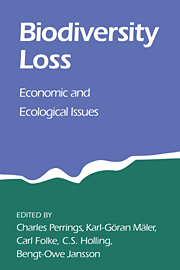Book contents
- Frontmatter
- Contents
- Foreword
- Preface
- List of contributors
- Introduction: framing the problem of biodiversity loss
- PART I CONCEPTUALISING DIVERSITY AND ECOSYSTEM FUNCTIONS
- PART II INTEGRATING ECOLOGY AND ECONOMICS IN THE ANALYSIS OF BIODIVERSITY LOSS
- 4 Wetland valuation: three case studies
- 5 An ecological economy: notes on harvest and growth
- 6 Biodiversity loss and the economics of discontinuous change in semiarid rangelands
- PART III ECONOMIC ISSUES
- PART IV CONCLUSIONS
- References
- Index
4 - Wetland valuation: three case studies
Published online by Cambridge University Press: 05 June 2012
- Frontmatter
- Contents
- Foreword
- Preface
- List of contributors
- Introduction: framing the problem of biodiversity loss
- PART I CONCEPTUALISING DIVERSITY AND ECOSYSTEM FUNCTIONS
- PART II INTEGRATING ECOLOGY AND ECONOMICS IN THE ANALYSIS OF BIODIVERSITY LOSS
- 4 Wetland valuation: three case studies
- 5 An ecological economy: notes on harvest and growth
- 6 Biodiversity loss and the economics of discontinuous change in semiarid rangelands
- PART III ECONOMIC ISSUES
- PART IV CONCLUSIONS
- References
- Index
Summary
Introduction
Should society be concerned about the loss of wetlands? The arguments and analysis in this chapter seek to construct a case for an affirmative answer to this question. Wetlands represent important forms of natural capital (Costanza and Daly 1992), and there is an urgent need for a balance to be struck between wetland conservation, sustainable utilisation and wetland conversion (Turner 1991). The management process will not be costless and therefore wetland assets require proper ecological and economic valuation.
Wetlands are multifunctional and can be considered as capital assets which require appropriate (sustainable) management if they are to continue to produce the flow of wetland derived functions, services and goods. This flow is generated by species and processes interconnected within their environment in what is referred to as life-support systems (Odum 1989). Life-support systems generate a range of ecosystem produced functions, services and goods of fundamental value to society.
Some life-support functions of ecosystems can be valued in economic terms, but others may not be amenable to meaningful monetary valuation. It has been doubted whether the full contribution of component species and processes to the aggregate life-support service provided by ecosystems can be fully captured in economic values (e.g., Ehrlich and Ehrlich 1992). We would further argue that the value of the aggregate life-support service including the ecosystem structure and function has seldom been recognised and not explicitly taken into account in economic calculations.
- Type
- Chapter
- Information
- Biodiversity LossEconomic and Ecological Issues, pp. 129 - 149Publisher: Cambridge University PressPrint publication year: 1995
- 5
- Cited by



